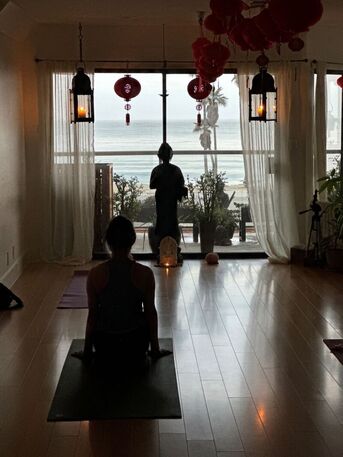Ashtanga Yoga Invocation
Ashtanga Prayer
|
OM
vande gurunam charanaravinde sandarshita-svatma-sukavabodhe, nihsreyase jangalikayamane samsara-halahala-moha-shantyai. abahu purushakaram shankha-cakrsi-dharinam, sahasra-sirasam svetam pranamami Patanjalim. OM Source: "The Language of Yoga: Complete A to Y Guide to Asana Names, Sanskrit Terms, and Chants" Translation: "Ashtanga Prayer - Ashtanga Yoga Invocation" |
Ashtanga Invocation: The First Shloka and the Second Shloka
"Ashtanga Invocation comes from two different shlokas that we put together to start our practice with respect. We always begin in Ashtanga with our hands in Anjali mudra, which is a universal, beautiful gesture of respect, and we always recite the invocation.
The first shloka, I bow at the lotus feet of the guru, which we interpret as respecting the practice and asking to get some of the energy, some of the goodness from the teaching to take it in. [...] That first shloka is about this practice being a medicine for the poison, so the doctor, the jungle physician becomes the medicine for us, for whatever our poison is. And again for me it's a very personal thing, all of us come to our mats from different places, at different times in your lives, different experiences, so maybe the poison is a little bit different. You come here for some health, some vibrancy, some healing.
And the second shloka is about Patanjali. We are honoring his Sutras[...]and it's a beautiful poetic honoring and respecting of Patanjali.
We say that when we do the invocation, we invoke something. What are you invoking? What are you inviting in the invocation? [...] Please consider what the invocation means to you." ~ Diana
The first shloka, I bow at the lotus feet of the guru, which we interpret as respecting the practice and asking to get some of the energy, some of the goodness from the teaching to take it in. [...] That first shloka is about this practice being a medicine for the poison, so the doctor, the jungle physician becomes the medicine for us, for whatever our poison is. And again for me it's a very personal thing, all of us come to our mats from different places, at different times in your lives, different experiences, so maybe the poison is a little bit different. You come here for some health, some vibrancy, some healing.
And the second shloka is about Patanjali. We are honoring his Sutras[...]and it's a beautiful poetic honoring and respecting of Patanjali.
We say that when we do the invocation, we invoke something. What are you invoking? What are you inviting in the invocation? [...] Please consider what the invocation means to you." ~ Diana

